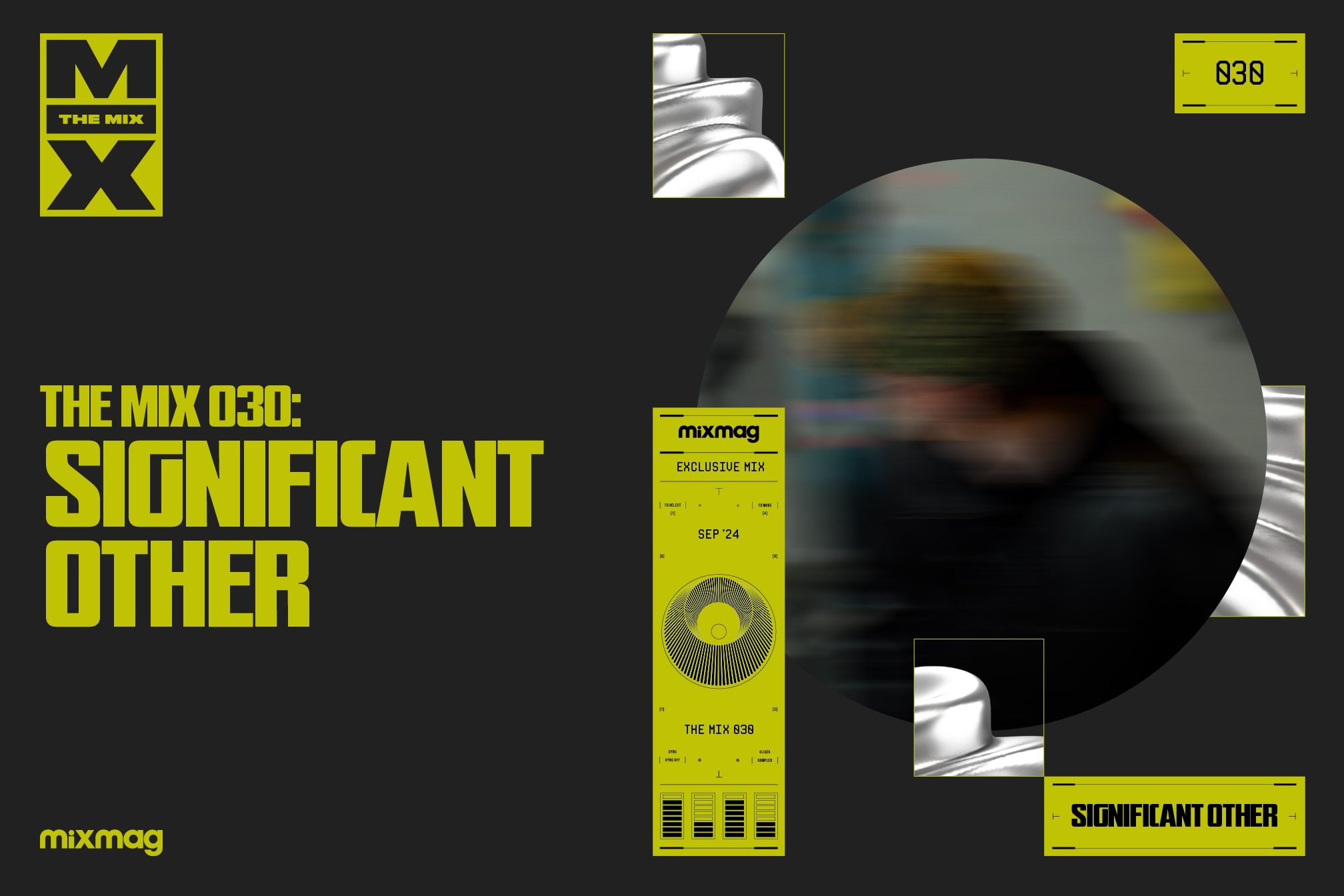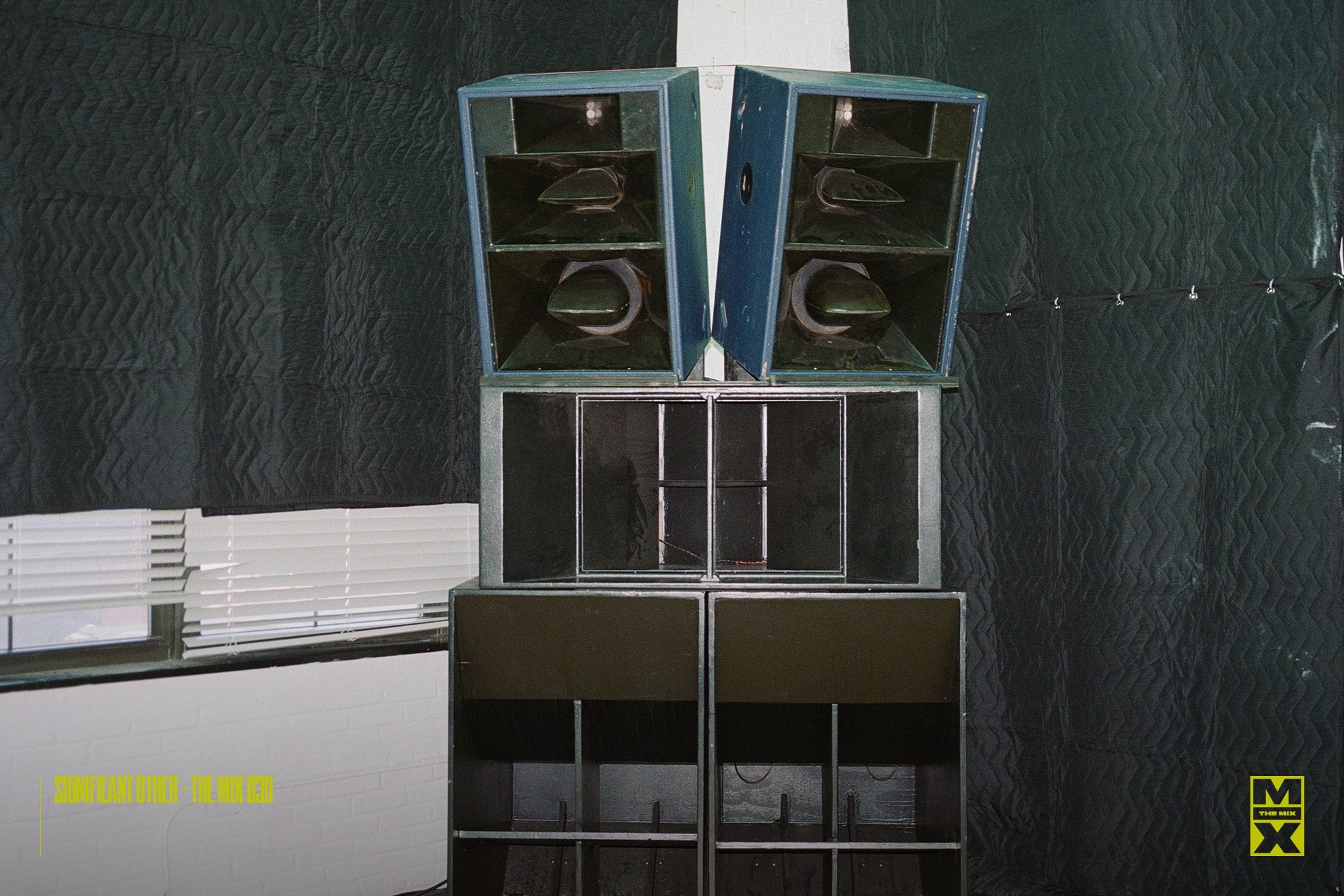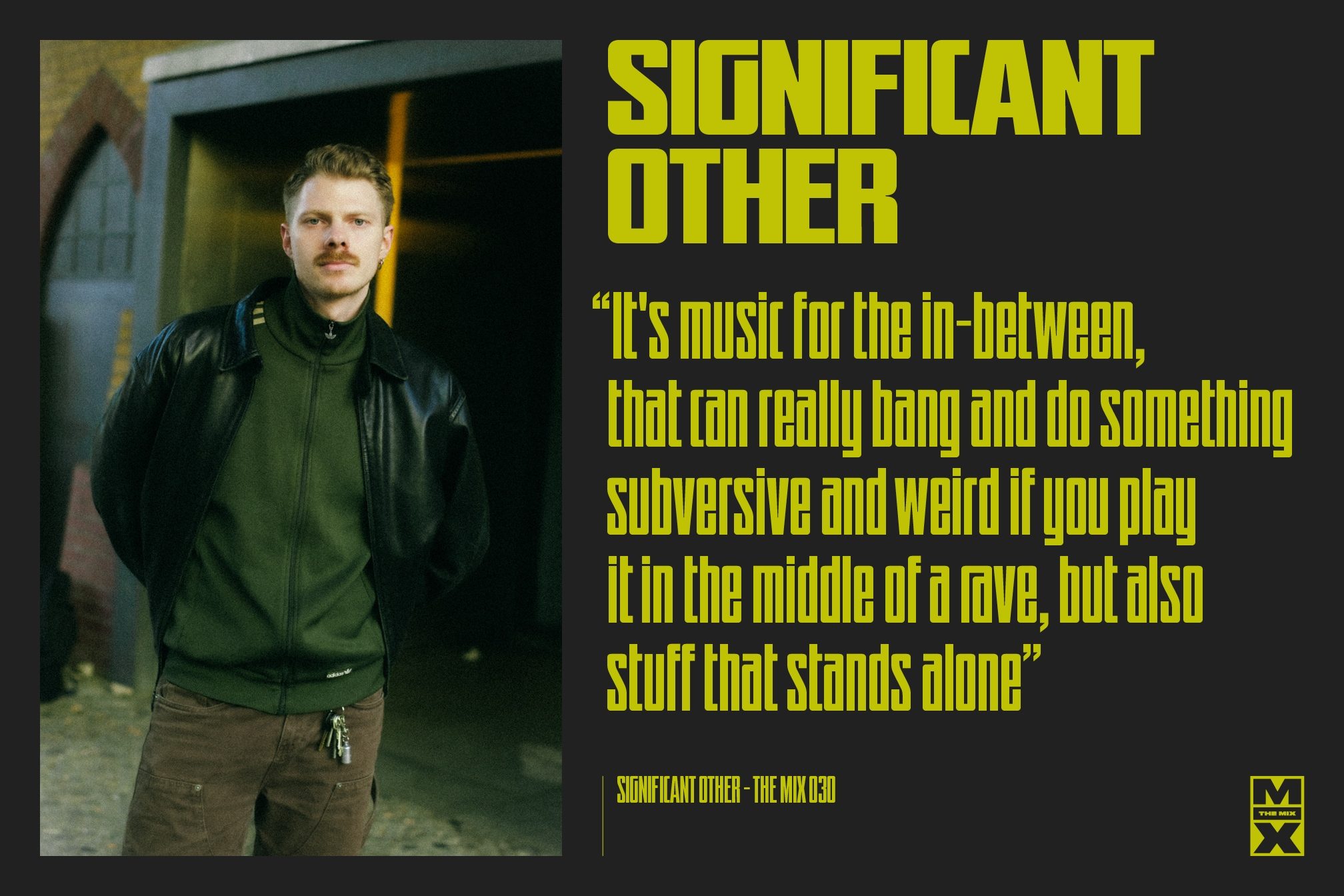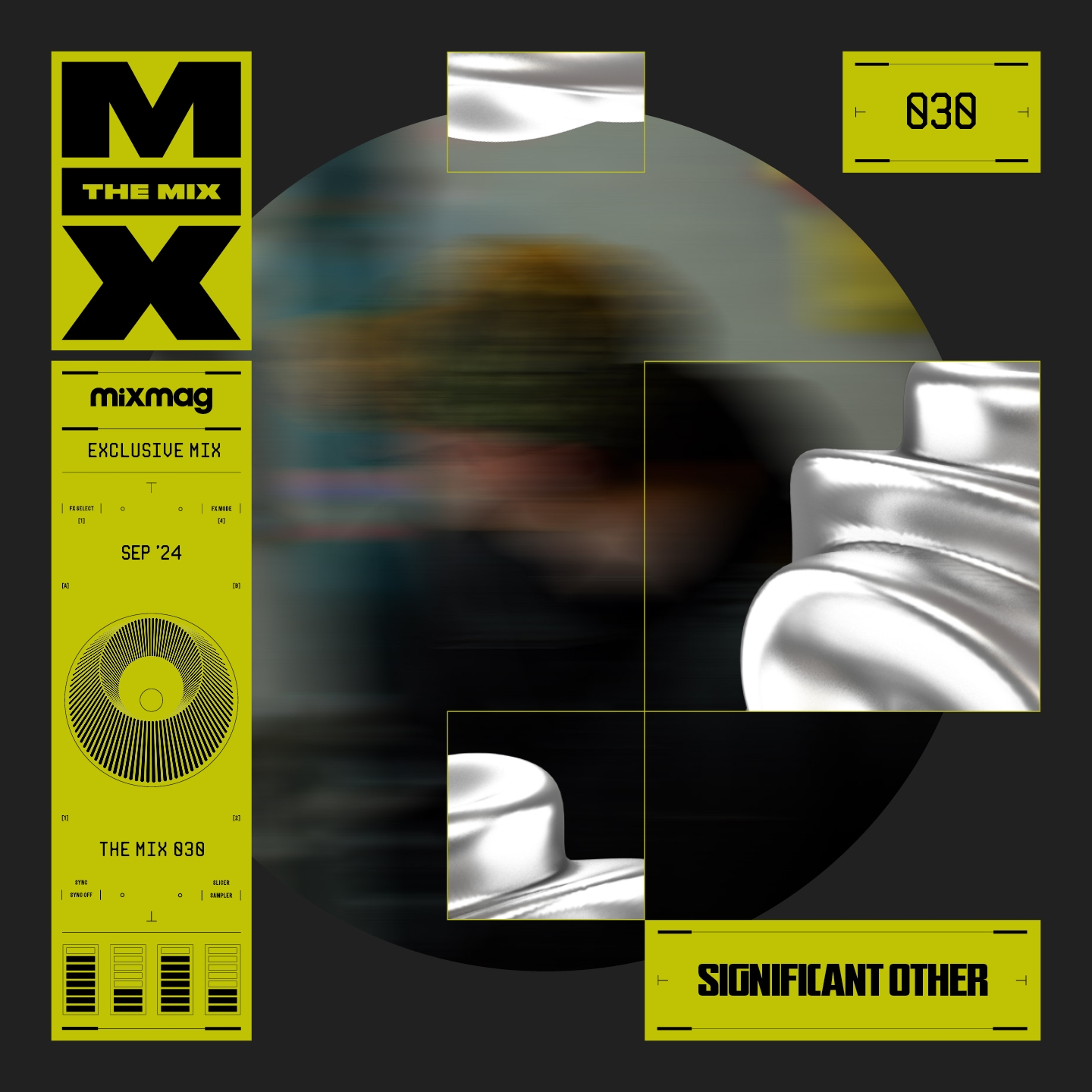 Music
Music
The Mix 030: Significant Other
Significant Other shares an exploratory, soundsystem-geared mix and speaks to Michael McKinney about his shifting relationship with dance music, the impact of pain on his process, and the inspiration that comes from slowing down
Roddy Parker, a Berlin-via-New York-via-UK club night mainstay who produces as Significant Other, is interested in the in-betweens. His music has, for a long time, been situated alongside UK dancefloor material. If you squint, you can hear the ghosts of Swamp 81 and leftfield dubstep flitting between the kick drums: the late-night drum workouts and bleary synth lines that run through ‘Club Aura’; the uneasy alliance between cragged ambience and steamrolling toms that make up ‘Oblivion’; the muscular breakbeats and brain-bending electronics of ‘Triptan’. He has spent the bulk of his career practicing this curious sort of alchemy, making club music suited for the ride home and ambient music designed for apartment-leveling soundsystems.
When Parker turned 20, he moved from London to New York, where he co-founded Club Night Club, an exploratory and off-the-grid party series that championed UK-indebted club sounds before much of the city wholeheartedly embraced them. That club night’s renegade spirit courses through Significant Other’s music to this day, even if his latest endeavors see him stepping outside of the club just a bit. After spending years working riotous and bass-blasted club nights, he’s shifted his focus—not towards lighter fare, exactly, but to something a bit hazier.
Earlier this year, Parker founded Pain Management, marking the occasion with ‘When It Rains’, which may be his most dimly lit record yet. One way to view the label is as an attempt to synthesize his—perhaps slightly dissimilar—interests: it promises both outré dancefloor stompers and sunken-eye world-building, sitting squarely between a crowded night out and an early morning alone. (If that all sounds a bit heady, not to worry: Pain Management recently threw their first club night in Berlin, grabbing Huerco S., Slowfoam, and Aeriform to perform alongside Parker.)
In light of a raft of life changes—a move to Berlin, a conscientious shift towards queasier sound design, the foundation of a long-simmering record label—we got a chance to sit down with Parker, digging into his changing relationships to dance music, how Club Night Club and pain have shaped him, the importance of slowing down, and much more.

Talk to me about falling in love with dance music.
I had a slightly turbulent social fallout in high school; I changed high schools and met this group of people who were, mostly, a year or two above me. They were quite into dance music. So, my first ever experience of being in a club was one where I was already psyched going into it, because these people who were being very nice to me—who I didn't know well—had said, "You should come to this thing." [It was my] first time seeing people dance to non-commercialized, relatively speaking, dance music, in a collective sense. It was kind of crazy. It was also my first time taking some experience enhancing—you know [laughs]. So it was almost a perfect trifecta.
I think a lot of the dance music I was first exposed to was pretty corny. It was small-town UK: liquid drum 'n' bass; a ton of bassline. It was still in that era where you'd get a lot of MC culture around bassline. In retrospect, [it was] a really nice thing. I was never going to events which were pulling heads, you know what I mean? It was more of a cross-section.
I'm curious as to which happens first: getting into production or moving stateside?
The former. Before I went to the U.S., I didn't know what I was doing, really. I got a job in London, but I was 18—I was a child. I had a few friends who were up there at university, but they were busy being at uni, so I had a ton of free time in the evenings. There's only so many movies you can watch, so I got Ableton and started teaching myself.
By the time I moved to the U.S., I'd already, in a very amateur way, been making music for a year or two. I was still figuring out everything, down to what I wanted to make, which would change between lunchtime and the evening. It was a few years before I started really taking it seriously. Even then, it was never, "I'm gonna make a career of this." When my first record came out, I was super young, and it happened by happenstance. I wasn't sending out demos or anything like that.
Talk to me about moving to New York.
Sometimes, you have an opportunity, and why not? I went pretty hard in my teenage years, with both dance music and the culture around it. I was probably crazier between the ages of 17 and 19 than I've ever been in my adult life, in terms of partying. At the time, I was like, "Some kind of big change could be cool." I think I'd been to New York once in my life before that. I didn't know what I was getting into or signing up for, but I fell in love with it.
When I moved to New York, I thought, "I'll study here for two to three years," and then I accidentally, at least at the time, in my head, became a lifer—or so I thought. In 2015 and 2016, dance music in New York was still quite a small community, in a way. It was a different era. I had some great times. I made all my friends and connections in New York through going to things: Bossa and crusty warehouse stuff in Brooklyn.
Read this next: Club Night Club is flying the flag for New York's warehouse party revival
What was the impetus for starting Club Night Club?
Fun memories! It's kind of weird to say now, given where the climate and the interest of dance music in New York is, but it was different at the time. At the time, techno was kind of a big thing. I grew up on Livity Sound, Hessle Audio, jungle, drum 'n' bass: very UK soundsystem-indebted music. It sounds crazy to say now, because that sound is super popular in the U.S., but, at the time, it was really difficult to find anyone in a social context who was into that kind of stuff.
I met Blake [Only Child]—we started, and run, Club Night Club together—in 2017 or 2018. We met through a mutual friend who asked us to help him out with starting a new party. When you meet someone, you say, "Oh! You're into this; you're into that." That's the way a lot of dance music playdates begin, where you go around to someone’s house and DJ for a few hours, and you're like, "Oh, cool—you're into this and that; you have the same gripes about this microscene we're in." And, very slowly, it became: "Maybe we could do a party."
We were like, "Why don't we try and do something where it's got high production value, but we're making the party we want to go to, both musically and vibe-wise?" Blake came of age in Minneapolis, so he'd experienced a lot of Midwestern techno stuff. He had this idea: if you do a party, the fixed cost is renting sound. If you want to do something where you're doing serious production with a serious rig, that's a high cost every time. So: why don't we buy the soundsystem? At the time, I thought it wasn't a good idea, but he had the vision, and we went for it.
When you think about it, it was a completely risky [and] terrible plan. We got a bank loan for a lot of money and got this big soundsystem. Then we really had no choice but to hit the ground running, because we owed quite a lot of money. It was baptism by fire, in a way: "All right, all of a sudden, we have this enormous rig in a storage unit in Queens. We have no money to pay or employ anyone. Let's go."
Over the years, the sound and scale of Club Night Club evolved, pushing into weirder territory and trying to platform artists we felt were doing something unique and could bring something special. The stylistic scope is pretty wide these days, and there aren't any genre constraints on what we want to showcase, but the roots of the project definitely lie in dance-focused and soundsystem-indebted music.
Have you felt your work with Club Night Club informing your own music?
Yes. The only times I ever DJed at CNC were typically the warm-up sets, when no one was there. But I take the warm-up set seriously; I wouldn't be playing anything dancey, really. I love doing warm-up sets; it's an opportunity to play weird, wonky, often beatless stuff. Through that, I'd get to hear completely non-club music in a club environment and notice how powerful it was, even if it was only playing to, like, 10 people. Between that and the sheer sonic fatigue of regularly hearing 12 hours of pounding dance music, I had already begun to lean into the non-club side of what I was interested in. So, paradoxically, doing Club Night Club and throwing raves actually pushed me in the direction of non-dance music.
From day one, I've always listened to a wide range of stuff that would be more classified as listening music. If you look at my earlier records, there's usually one ambient track—I think the Well Street record is the only one that's all club tracks. During COVID, I leaned into that way more and put out my first album ['Residuum'], which is all non-club music. So I think it was a weird timing thing of having gone deep in that direction—no clubs, leaning into that sound—and then coming back and plunged into this hectic post-pandemic New York rave world. It pushed me even further away from dance music, ironically.

In that context, talk to me about Pain Management.
[It was] a long journey to get to where things are at now. The thing I'm very private about, generally, until recently is: the background influence [on] my life, and my relationship with art and music, has always been illness. Since I was a kid, I've always had a quite challenging issue with chronic illness. I have chronic migraines, which started when I was about five. The classification to get to the chronic label is, generally: more than 15 days out of the month, you have a headache or migraine that's incapacitating.
I've always tried not to push that too much publicly, in regards to music, because you don't want to feel like you're labeling yourself or making it a gimmick. But, essentially, my entire lifespan of consuming music has fallen into a context where, 50% of the time, music is a painful thing that I can't stand. If you have a migraine or a headache, [sound] is, obviously, difficult. That's shaped me as a person, a DJ, and a producer. Doing CNC over the years—doing anything, like getting a college degree, holding down a job, all that stuff—it always came with this layer of difficulty, because I would very frequently have migraines. So doing the raving stuff is very hard. With CNC, it was: the thing you love doing is the thing that's actively worst for you.
In 2022, I got COVID, and I got a migraine, and it basically didn't go away for about a year-and-a-half. It was a level of pain and incapacitation that I'd never encountered. It was brutal. I was dealing with interpersonal stuff at the time; I was in New York trying to just keep my head above water; I was trying to work when I couldn't, and to pay the bills, and to be an artist and a DJ. All of that began to collapse for me. I lost my job. I couldn't really leave the house for, quite literally, weeks on end.
My life collapsed, and my relationship with New York City became completely untenable. I had to come to terms with the fact that I just can't be here anymore. Since then, I've emigrated to another country, because it's cheaper and quieter. All of that is to contextualize Pain Management: even prior to this, I had been wanting to do something a little different for a while. The aim for the project, loosely, is to present music that falls in the in-betweens. I'm hoping the label itself can be a project rather than just an outlet putting out cool music built around a certain aesthetic. If it has any connection to me, it's gonna be stuff that is consistently inconsistent—sonically, at least.
The first record, I think, is quite a good distillation of where I'm at at the moment with music: four quite different tracks that straddle the line between listening and club. I spent a lot of time engineering it so it would punch on a soundsystem, but none of it's super banging. Basically, I would like people to play the stuff that seems to be non-club in a club, and I would like people to play the club stuff on their ride home. It's music for the in-between that can really bang and do something subversive and weird if you play it in the middle of a rave, but also stuff that stands alone.
'When it Rains' feels, to me, like it’s halfway between new-school trip hop and sound-designed electronics.
I wrote that track when stuff was pretty bad in New York—Boomkat called it a "drowning struggle." That was a track I wrote when I felt like the walls were closing in. My health was bad; I was worried about money; I didn't know what I was doing. It's a dark city. That was a phrase my mom always used to say: "When it rains, it pours." Especially in New York City, you lose your job, and in that same week, your roommate's like, "I saw a rat," and then you get a cold. Sometimes, the universe aligns. Bad things can happen in threes. Good things can happen all at once, too.
When you reference this stuff, the first thing that comes to mind for me is new-school sort-of-ambient—the folks who are saying, "How can we take ‘listening music’ and make it queasier?"
I feel that. Even if I'm making music that has nothing to do with the dancefloor, and I'm recording guitars, my entry point into really caring and structuring my whole life around music came from being a dance music head and being a teenager in a club. That was the catalyst. I've got a range of things coming up, but, next, it'll be an LP that is built around a wider concept and that isn’t club-related in any way. But it has a tethering to club culture, because it's made by someone who is knee-deep in that and always will be.
What’s something you recently learned about yourself?
This whole last year, and this move to Berlin from New York, came from this realization that things change, and your capacity for certain things changes. I've realized I require quite a lot of calm and quiet and alone time. That realization began when I decided to try and leave New York, and it was cemented through the time being apart. When I was younger, I loved the social component of doing parties, knowing loads of people, and being out and about. I guess I've learned that I benefit creatively, personally, [and] life-wise through quiet, calm, and a smaller amount of social time, which is a valuable lesson.
I don't know how it took me so long to realize that, but I think the environment plays a huge role. New York is a city where you're constantly burning the candle at both ends. It's hectic. It's a hustle culture. You've got to be grinding, whatever you're doing. For me, on a creative level, by moving somewhere a bit calmer and quieter with a lower cost of living, you have these gaps that emerge where you're not really doing anything. You're sitting in the park on a Tuesday afternoon with a book. You have the leisure to be able to do that. It's often in those "gaps" between things that ideas and revelations arise, because they have the breathing space to float up out of nowhere. I like taking my foot off the gas pedal a little bit and being calmer, quieter, and less busy. It's allowed things to arise more organically.
What’s next on the horizon for you?
Hopefully, the rest of this year and the start of next year will be busy in a way that's sustainable for me. I feel very grateful to be slowly getting more chances to play out, do what I want on the decks more, and visit [more] places. By the time this airs, I'll probably be ready to announce, or have announced, that the next record is a collaborative release from two artists I really admire.
It's the first in a series of singles coming out on Pain Management. It's a two-tracker with a limited run of seven-inch records, and I would say it's a really great encapsulation of the Pain Management's direction and where it's headed, in that it's a fusion of two different disciplines. It's fusing hellish dark sonics with profound [and] tender spoken word to create something kind of weird and, I think, quite moving.
Can you tell us about your mix?
I had a lot of fun recording this mix. It consists of road-tested favorites from the past year, new finds and some older go-tos. Recently I’ve been trying to incorporate more off-grid, non-dance music into club sets—playing around with layering unquantized styles to get that nice rough around the edges feel. I think it’s a good representation of what I try to do in a club setting—rapid cycling through different genres and styles in a way that throws you around a bit but remains danceable. All of it indebted to and geared towards the soundsystem. A lot of three-deck action and healthy dub siren usage throughout. Thanks for inviting me to contribute to the series!
Michael McKinney is a freelance writer, follow him on Twitter
Listen to Significant Other's first Pain Management release, 'When It Rains', here

Tracklist:
Low Jack - Shell
John T. Gast - Fugue ii
Powell - The Ongoing Significance Of Steel And Flesh
DJ Marcelle - Respect Caged Animals
Rental Snakes - Mum’s Dub
Meleke & MC Waraba - Tassaba
Santaka - Burning Head
Basitian Benjamin - Manuscript
Loops Haunt - Rubber Stun Grenade
Itoa - Ever Orbit
Significant Other - Cellar One
Dakn x Muqataa - Fi Miad
Ward 21 - OG Kush
Eszaid - Members Stand
Tackle - Smoke Point
Bruce - In Line
Dalibor Cruz - 05
Slikback - Kyokai
Weird Weather - The Drunken Monk
G Sudden - Ghetto Youth Wha Rich
Indo G - Throw Them Thangs
Mortimer Dubatron - C U M B I A T R A N C E 2 0 2 0
Low Jack - More Speed
Froid Dub - Shotgun Dub
Susu Laroche - Washing Touch Off
Ulwhednar - Pir Motion Detector
Ghost Warrior - Fracture
Sockethead - Keep Missing That Last Stop
Mantra - Burn & Heal
Vardae - Rites
Shaken Hanzo - Shoto
Angel Hunt & Lou Venturini - Fenced Blue Verges
Dalibor Cruz - 01
Mamelon - Koumba Frifri
Holy Tongue - Threshing Floor
Andy Rantzen - Dub Generator
AIR LQD & Abdullah Miniaway - How Do You Burry A Paperless Man
Jabu - Lately Version
Simone - 006
Frank Watlington - Solo Whale
Nakibembe Embaire Group - 160
Dekalog - Speed Skate
DJ Sandji - Bacoungana
Styward - Dub Cowboys
TNT Roots - CHANT DOWN BABYLON VERSE II
Emeka Ogboh - Danfo Mellow
Jabu - Us Alone (Time Cow Remix)
Asian Dub Foundation - 1000 Mirrors ft. Sinead O’Connor


